 Flowers and mementos are left outside the funeral for Lori Gilbert Kaye, who was killed inside the Chabad of Poway synagogue by a gunman who opened fire during services, on April 29, 2019 in Poway, California. (Photo by Mario Tama/Getty Images)
Flowers and mementos are left outside the funeral for Lori Gilbert Kaye, who was killed inside the Chabad of Poway synagogue by a gunman who opened fire during services, on April 29, 2019 in Poway, California. (Photo by Mario Tama/Getty Images) A gun control group has filed a lawsuit on behalf of survivors of the Chabad of Poway shooting attack that took place on April 27, 2019. The group is suing the gun manufacturer and the dealer that sold the weapon to suspect, John Timothy Earnest .
The lawsuit was filed in San Diego court on June 15 by Brady Legal, which does litigation for the gun control nonprofit organization Brady United. It is representing Rabbi Yisroel Goldstein, the former rabbi of Chabad of Poway who lost a finger in the attack, and eight other victims of the shooting, who suffered either physical and/or emotional injuries. Five of the eight victims listed in the suit are minors. The family of Lori Gilbert-Kaye, 60, who was killed in the attack, is not part of the lawsuit.
“The victims of the shooting don’t want an incident like this to ever happen again,” Jonathan E. Lowy, vice president, Legal Action Project at Brady and the plaintiffs’ representative, told the Journal in a phone interview. “That’s why we are representing them.”
The plaintiffs are suing Smith & Wesson, which manufactured the M&P15 AR-15-style semi-automatic assault rifle used in the attack, as well as San Diego Guns, where he bought the rifle, for monetary relief. They’re also demanding that the involved parties modify their business practices.
The lawsuit argues that Smith & Wesson markets guns in a way that attracts or embolden killers, and that the AR-15 could be converted into an illegal assault weapon.
“Unfortunately, for some companies, it takes internalizing the harm that they caused to others to get them to act responsibly in their business practices. We and the plaintiffs hope to make all Americans safer.” — Jonathan E. Lowy
“There are certain design features of an assault weapon that are particularly useful for the mass killing of human beings,” Lowy said. “These are features that are either not useful or legitimate for self-defense or hunting, and may even be counterproductive to those purposes. California law spells out what those features are, and this is a gun that we allege could and was easily modified to be that sort of gun.”
The filing states in part, “This lawsuit does not seek to hold firearms manufacturers and/or sellers liable for responsibly making, marketing, or selling weapons for use by law-abiding citizens while complying with all relevant standards of care and applicable laws designed to prevent unlawful acts of violence. Instead, this lawsuit seeks to impose liability for irresponsible and unlawful conduct by a firearms manufacturer and seller for making, marketing, or selling weapons in an unsafe and illegal manner.”
The lawsuit also alleges that San Diego Guns violated California law because the suspect used a California hunting license that was not yet in effect when he purchased the gun.
Lowy said the lawsuit is in its initial stage. The complaint has been filed, and the defendants will be served and need to provide an answer. He estimates that at the very least, the case will take more than a year to complete.
Brady has been bringing these cases for more than 30 years. James and Sarah Brady started their nonprofit after James — who was White House press secretary for President Ronald Reagan — was shot during the assassination attempt on the then president on March 30, 1981. Brady died 33 years later and his death was a ruled a homicide as a result of that the shooting.
According to Brady’s website, Americans kill one another with guns at 25 times the rate of other high-income countries, and 155% more people are shot in incidents where high-capacity magazines or assault weapons are used. A Smith & Wesson M&P15 Sport II AR-15-style semi-automatic rifle was used in the Parkland, Fla., high school shooting on Feb 14, 2018, and the victims’ families also filed a federal complaint against the gun manufacturer.
With their lawsuit, Lowy said the plaintiffs want to prevent a tragedy like theirs from happening again, whether it’s in a synagogue, church, movie theater or classroom. “That can be done if the manufacturing dealers change the way they do business and agree to specific reforms in how they market and sell their guns in a responsible way,” he said. “It can also happen if they are held accountable and have to pay for the harm that they caused. Unfortunately, for some companies, it takes internalizing the harm that they caused to others to get them to act responsibly in their business practices. We and the plaintiffs hope to make all Americans safer.”























 More news and opinions than at a Shabbat dinner, right in your inbox.
More news and opinions than at a Shabbat dinner, right in your inbox.